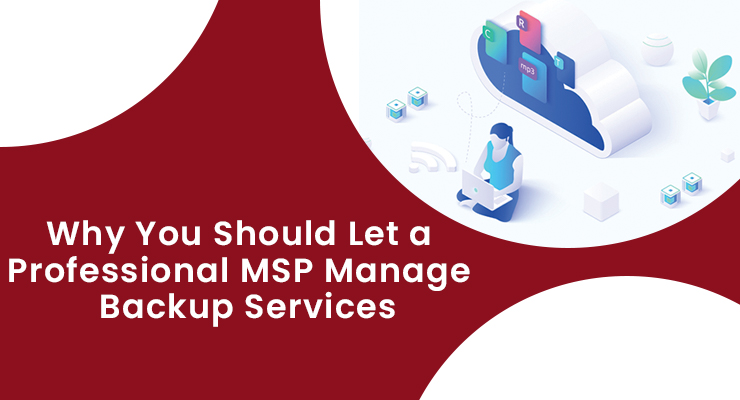Ransomware, natural disasters, power outages and equipment failures can take down your business. And it’s not a matter of if, but when. In 2022, ransomware attacks rose 350% worldwide, costing businesses more than $75 billion each year. Now more than ever, many businesses are pursuing the benefits of managed backup to protect their data from cyber threats.
Traditional onsite backup solutions are time-consuming and offer limited storage. Plus, backup systems can easily cost your business thousands of dollars per month to manage and maintain.
Today we’ll share why a managed backup service is an ideal solution for small businesses, along with 8 unique benefits of managed backup solutions.
WHAT ARE MANAGED BACKUP SERVICES?
A managed backup solution relies on a third-party managed service provider (MSP) to create and store backups of your data, typically using cloud managed backup technology to secure your files offsite.
Most MSPs recommend using cloud storage for backups to protect data from any threats based on your physical location. Storing backups remotely adds another layer of security while also enabling organizations to access their data from anywhere.
Although you could take the DIY route for your data backups, adding more personnel and technology to build and manage your backup infrastructure in-house can be time-consuming and expensive.
8 BENEFITS OF MANAGED BACKUP SERVICES
One of the biggest advantages of a cloud managed backup service is that important files are stored offsite in case a business’s network is compromised by a ransomware attack or another cyber threat. Below are 8 more benefits of managed backup services for SMBs:
1. CONTROLS COSTS
On-premises data storage can become quite expensive, especially when you need to expand your storage bandwidth, which would require adding new hardware like servers, modems and more.
However, like many other cloud storage solutions, the cost of managed backup services is based on how you use them. For example, if your business doesn’t need to store that much data, then you only pay for what you need. This makes it easy for organizations to scale their data backup needs as their business grows, without needing costly data storage equipment.
2. KEEPS SENSITIVE DATA AND APPLICATIONS SAFE
For many organizations, backing up data goes beyond having peace of mind and protecting their professional reputation. Meeting IT compliance requirements is an essential part of organizations in heavily regulated markets like healthcare and finance.
But businesses have a lot to worry about outside of their data security. By partnering with an MSP, you can leave that to the professionals so you can focus on your core business. Many MSPs use multiple layers of security, such as end-to-end encryption and multi-factor authentication, to protect their clients’ data and applications from unauthorized access.
3. OFFERS PROACTIVE MONITORING
Many SMBs have a small in-house IT team that oversees their daily technology and cybersecurity needs. But the rising threat of cyberattacks can easily overwhelm a small team of one or two people.
With managed backup, an MSP proactively monitors your facilities, data centers and cloud storage to ensure everything is running smoothly. If something goes wrong, they can address it right away and keep you in the loop so you don’t have to worry.
4. PROVIDES 24/7/365 RECOVERY AND RESTORATION
Outsourcing your managed backup needs to a third-party provider means you will have a dedicated team overseeing your cloud managed backup, making sure your network is secure and monitoring any possible threats to your data security.
If your data is lost or compromised, you can rest easy knowing that your managed backup provider is already working on recovering any lost files and restoring your systems to normal.
5. MINIMIZES DOWNTIME
The chances that your business will be impacted by a ransomware attack or another cyber threat are high.
Managed backup protects your data from common cyber threats so that if your systems are infiltrated, you don’t have to pause operations while scrambling to recover lost or stolen files. For example, if your files are stolen and locked in a ransomware attack, you can easily resume business operations using your backup data instead of paying the ransom or trying to continue business as normal without your data.
6. ADDRESSES RTO AND RPO OBJECTIVES
Your recovery time objective (RTO) and recovery point objective (RPO) are critical IT KPIs that measure your business’s disaster recovery planning. Your RTO is how much time your business has to resume operations to avoid unacceptable repercussions, such as extended downtime and an inability to provide services.
Your RPO refers to the maximum amount of data (measured by time, usually hours) that you can afford to lose after a disaster or system failure. For example, if your RPO is 15 hours and your latest data backup was from 12 hours ago, you are still under that threshold. With managed backup, you can ensure that your files are backed up as often as needed to preserve business continuity in case of an emergency.
7. FREES INTERNAL IT STAFF
As mentioned earlier, an internal IT team already manages a full list of day-to-day responsibilities without adding data backups to the mix. By partnering with a managed backup service provider, you can free your IT staff from the time-consuming task of overseeing data backups so they can focus on your everyday IT needs.
8. GIVES YOU PEACE OF MIND
One of the most important benefits of managed backup is that you can rest easy knowing your corporate data is protected in the event of a cyberattack, ransomware or disaster. With managed backup and a disaster recovery plan in place, your business can quickly get back on its feet.
To learn more, contact us today.


